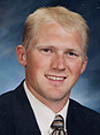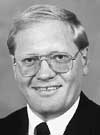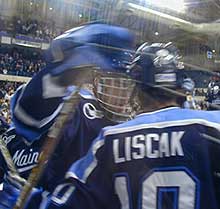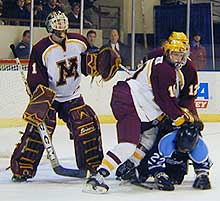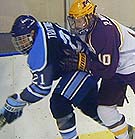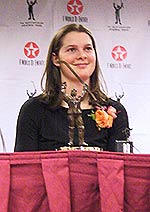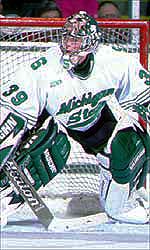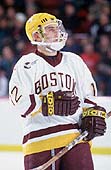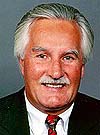One week ago, the Mercyhurst and head coach Rick Gotkin pretty much thought of going to the NCAA tournament West Regional in Grand Rapids, Mich., as just another road trip. Heck, it was only a six-hour drive from their home in Erie, Penn. Considering that most of the games the Lakers play in the MAAC are anywhere from eight to 10 hours from home, the shot to Grand Rapids was a piece of cake.
Okay, so maybe the fact that Mercyhurst’s first-round opponent was the University of Michigan, a program with almost as much legacy in college hockey as the New York Yankees have in pro baseball, should have given away the fact this really wasn’t your average road game. But Gotkin still didn’t see it that way.
“It felt like another road trip until I walked into the Friday press conference,” said Gotkin. “When I sat at the table with Red Berenson and saw all the media sitting there and the cameras and the bright lights. That was the first time at which I said to myself, ‘Oh, this isn’t another road trip.'”

Gotkin
Still, then, bright lights and big city didn’t make the Lakers or Gotkin waver. Their near-upset of the Wolverines one day later gave the Mercyhurst crew plenty to hang their hats on.
“[Mercyhurst President William Garvey] told me that it was a great moral victory for me,” said Gotkin, laughing. “But he also said that I’m only allowed one of those.”
Garvey’s message was just one of many that Gotkin has gotten since Saturday’s game.
“One of the best things that has happened is that a lot of people in the MAAC, from administration to coaches to players, have either emailed or phoned saying ‘thank you.’
“I’ve gotten email from kids from Iona and Bentley. Coaches from all the teams. ADs from MAAC teams. They all say that this is huge for our conference.
“We knew going in that we had a huge responsibility. This whole game is about respect. We didn’t win, but I think we gained an element of respect.”
Gotkin is right — the MAAC needed, and still needs, respect. Message boards and chat rooms were filled last week with naysayers who felt that the MAAC and Mercyhurst didn’t belong in the NCAA tournament, and that they were there only because of a “loophole” in NCAA legislation. And maybe these folks do drive home a good point.
The MAAC hockey conference, in a way, is untested. And those tests that it has faced, you can’t say it has passed with flying colors. The world of nonconference play wasn’t very kind to the MAAC this season — or even to Mercyhurst. The Lakers entered the tournament with a 0-4-1 record in games against teams outside of the MAAC.
But that’s not what the NCAA is about, and Mercyhurst proved that. As long as conference champions are allowed to receive automatic qualifiers, the NCAA tournament is not about selecting the top 12 teams in the country. But that doesn’t mean that the teams selected won’t be competitive.
If we look back to this year’s regional tournament, two of the best games featured Mercyhurst and St. Lawrence — the only two teams that would not have made the tournament if it weren’t for receiving the automatic qualifier. Granted both clubs came out on the losing end, but it made for a competitive tournament.
Gotkin talked about how Michigan’s Berenson, even, was made a believer Saturday.
“After the game, Red came up and said, ‘A lot of people didn’t believe the MAAC belonged in this tournament. They believe now,'” Gotkin said. “I really believe now that nobody can look a MAAC coach in the eye and say [the MAAC] didn’t deserve to be there.”
Survival Was Game Plan
It was clear that Gotkin’s game plan heading into the game with Michigan was simple — to survive. The first few minutes were critical, and if they Lakers were going to give Michigan a run for their money, they couldn’t be in a hole early.
"We knew going in that we had a huge responsibility. This whole game is about respect. We didn’t win, but I think we gained an element of respect."
— Mercyhurst coach Rick Gotkin, on the Lakers’ NCAA tournament experience
“We knew the first ten minutes were going to be key,” said Gotkin. “Certainly goals are momentum, and when we scored the first goal, we had a bit of momentum.”
Worry, though, came when Michigan responded, not once, but twice — in an NCAA tournament-record span of six seconds.
“When Michigan scored two quick ones, people figured the rout was on,” Gotkin said. “But [goaltender] Peter Aubry made some big saves later in the period to keep the game 2-1. And Brad Olsen’s goal with a minute and a half left in the first was probably the biggest goal of the game.
“We thought in the dressing room that we had the chance at that point, and that we just needed to score the next goal.”
The Lakers did score the next goal, and, even more positive, it didn’t come until the 6:15 mark of the third period. That’s right, the third period. This game of survival just got a lot shorter.
We all, though, know the ending by now. There was no Miracle On Ice, no storybook ending for the Lakers. The Wolverines finally came back and scored twice in the third and won, and now, after a win over St. Cloud, are on their way to the Frozen Four.
“We did a lot of things right,” said Gotkin. “We played our game. The shots we allowed were mostly perimeter shots and Peter Aubry played great. We held Michigan to 1-for-6 on the power play. But I sensed as long as there was time on the clock, Michigan could score a goal. And that’s exactly what they did.”
Heart Kept Lakers Going
In comparing Mercyhurst to Michigan, Gotkin’s point was simple and clear.
“In the end the better team won — there’s no question about that,” said Gotkin. “They were the more skilled team. They were the better team.
“But what we lacked in skill and resources and talent, we made up with heart. That’s not to say that Michigan doesn’t have those things. But for us, it was a different situation. It was our lifeline.”
Truly Mercyhurst’s heart was its only chance. And to everyone who watched the game, to the media who covered the game, to those who listened to the game on the radio — that was apparent.
“Our kids came into the rink and we had kept reminding them that we belonged here,” said Gotkin. “We earned our way here. But we couldn’t let these kids get too wide-eyed.”
In speaking with Gotkin a couple of days ago, it was obvious that he was excited to earn respect. Not for Rick Gotkin, because, simply put, he’s not a coach who enjoys the personal spotlight. Gotkin feels the team’s performance earned the respect for his players, his school and, most importantly, his league.
“As we were walking onto the ice, I heard someone say, ‘If that Mercyhurst team were smart, they wouldn’t even leave the locker room.’
“The ‘MAAC Massacre’ — that’s what people were calling it. People weren’t just expecting Michigan to beat us, they expected them to beat us by ten.
“We wanted to be able to come out of there and say we played well. So our kids weren’t good enough to conquer Michigan, but we earned some respect that day. You earn respect every day. No one gives you that respect, you earn it.
Gotkin also doesn’t mind addressing the naysayers around the country.
“We’ve made some fans,” said Gotkin, who received an ovation from the media when leaving the press room after the game. “The people who still don’t like the MAAC, that’s their business.”
What Lies Ahead
Gotkin is the first to admit that, as nice as it would be, he can’t expect to return to the NCAA tournament every year. So to relish this year’s ride for a while isn’t a bad idea.
“My carriage is going to turn to a pumpkin soon,” joked Gotkin. “But that’s okay. It’s about the family and respect. We have both of those here.
“I’ve made mistakes in my 13 years, but we still have people who support us through the good and the bad. That’s what makes this great.”
Gotkin noted that about 300 people made the trip from Erie up to Grand Rapids. On top of that, the fans of Michigan State and St. Cloud cheered on the Lakers, giving them a pretty vocal support corps in the arena.
The Lakers are slated to lose only four seniors to graduation, which may seem like a small number. But the players they will lose are top names. Seniors Eric Ellis and Jody Robinson were all-league players this season, while Jeff Gould was named MVP of the MAAC tournament. Senior Mark Stamp’s contribution may not be noticeable looking at stats, but Gotkin endorsed his value to the club.
Those who will return, though, return with experience.
Tournament experience.
NCAA experience.
And no coach in the country can recruit that.
“These players learned a lot [last week],” said Gotkin. “I really liked their focus. They never let the hype get to them.
“We were practicing [on Friday] and we went to work on the power play. Now unlike other teams, we don’t have a bunch of different color practice jerseys. We only had two.
“So we had to change in the middle of practice [to work on the power play]. I told the guys they could go into the runway to change so that everyone watching wouldn’t see them. But they said, “No coach, we’ll do it like we do every day.”
Understandably, whether you’re Mercyhurst, Michigan, or any other program in the country, any trip to the NCAA tournament is special. Gotkin, who also brought Mercyhurst to the Division II and III tournaments in the last decade, noted this one was a little extra special.
“We’re the first MAAC school to make it to the NCAA tournament,” said Gotkin. “It’s special because there is only one first. It’s nice to be the first team in there.”
